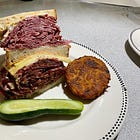It Should Always Be This Fun
Preserving the ubiquitous joy of Opening Day
Bottom of the last inning. Tie game. Bases loaded. Two outs. There were no extra innings — it all came down to this at-bat. I was nine years old, and as I stepped to the plate on a warm summer night, I knew it was the biggest moment of my athletic career.
I had been playing baseball with the same group of kids since T-ball. They were fixtures in my life every summer, and even the spring — when the parochial school where most of them went was short on players, they brought in a Jewish ringer to their CYO roster. During the season I spent more time with their parents and siblings than most of my own relatives.
Often I was the worst player on the team. I was small, slow, and a little afraid of the ball. I could make good clean plays on grounders to third base, but not quickly enough to throw the runner out. Fittingly for my future career, my best position was statistician. Yet I never felt like my lack of athleticism mattered. The coterie of dads who rotated in to help run the team fostered an atmosphere of friendly competition in which friendly was far more important than competition. We all liked to win, but we went out for ice cream together afterwards either way.
Most seasons our head coach was Chaz, whom I adored. He wasn’t “Mr. Deptola” or “Coach Deptola” or even “Coach Chaz” — just “Chaz.” Going by his first name was representative of the tone he set for the team. He believed in the fundamentals and saw it as his responsibility to teach them, but always did so with a smile on his face. He never embarrassed his sons or gave them special treatment. He went out of his way to make every single kid feel encouraged and supported.
Chaz was my coach during my formative years when baseball grew from a hobby to an obsession. In retrospect, given that I went on to work for MLB teams, his commitment to making it fun probably changed the course of my entire life.
Two things happened when aged out of coach-pitch and made the leap to the kid-pitch league. First, Chaz handed off the reins to Coach Kevin. I’m calling him “Coach Kevin” here because he’s the kind of guy people probably Google, and it doesn’t seem necessary for this to pop up when someone looks him up for professional reasons. But it’s important that you know that I never called him by his first name. He wasn’t that kind of guy. Even when working with kids who knew him well, and after inheriting his leadership role from a beloved coach who went by “Chaz.” To us he was “Coach LastName,” if not “Mr. LastName.” Enough said.
I considered Coach Kevin one of the meanest adults I knew. Maybe he thought our group of generally amiable and well-behaved kids needed a few hours a week of tough love. Maybe he was just a jerk. He wasn’t afraid to chastise the team if we played poorly, or if he thought we weren’t demonstrating the diligent focus and sound fundamentals befitting of our suburban youth rec league.
One time his son was pitching and had the yips, but Coach Kevin refused to take him out of the game. The poor kid kept calling out to the dugout, crying from both arm pain and embarrassment, begging his dad to go to the bullpen. Coach Kevin stood stone-faced against the chain-link fence and defiantly watched his son struggle until the umpire invoked the mercy rule. I remember being glad he wasn’t my dad. (Though he turned out to be quite a schmuck, too.)
The second change was that I became a much more valuable player. Being the shortest kid in the league came with an advantage: I walked a lot. The fourth-graders on the mound couldn’t find my tiny strike zone. I learned that I had a better chance of getting on base if I waited for ball four than if I actually swung. Long before I read Moneyball, I would proudly report how high my OBP was. I earned a reputation for my plate discipline. Years later I befriended someone who’d been on another team in the same league, and she recognized me as the kid who always walked. She recalled her coach’s futile exasperation — Don’t walk Lewie! — moments before I inevitably jogged to first base.
So as I stepped into the batter’s box that fateful night at Cumberland Park, I was in no hurry to swing. I took the first pitch. Then the second. I worked the count to 3-2 with the bat resting on my shoulder. The payoff pitch came in at my knees but outside, three inches off the plate.
Ball four. A walk-off bases-loaded walk. A literal walk-off. My heart soared. My patience and keen eye had paid off. It was the single greatest moment of my sports life.
The umpire had other ideas. “Strike three!” The game ended in a tie.
I walked back to the dugout in a daze, holding back tears as my teammates packed up their bags. It wasn’t just the disappointment of coming up small in a big spot. It was the injustice. I can see the pitch vividly in my mind’s eye like it was yesterday. I am as sure that it was off the plate as I am that the sky is blue. I deserved to be the hero. Instead I was the goat.
Coach Kevin saw me alone on the bench and wandered over to join me. He was easily three times the size of the kid with the postage-stamp strike zone, and the metal bleacher creaked and jostled under me as he sat down.
He turned to me and said, softly but sternly: “We could have won the game.” Then he stood up and walked away.
Everyone’s an optimist on Opening Day, which for most MLB teams was last week. The excitement was palpable, even amid the DDoS-esque deluge of horrors going on in the world. It signals the approach of summer and the resumption of a bedrock day-to-day rhythm. It is the moment when sports fans watch the greatest game in human history with the rosiest-tinted glasses. It is the time when we experience baseball with the peak collective sense of childlike wonder.
It occurred to me that our goal as baseball fans ought to be to maintain this magical feeling for as long as possible.
This thought brought me back to that fateful insult from Coach Kevin. It wasn’t just a cruel thing to say to a nine-year-old. It was also someone who presumably considers himself a baseball fan — he devoted his summer to teaching kids how to play it — going out of his way to discourage a young person’s enthusiasm for the sport.
In retrospect it’s amazing that that night didn’t turn me off of baseball altogether.
Baseball, the famous saying goes, is designed to break your heart. It’s true that eventually. But in the words of Mitch Hedberg, the first and the middle part are amazing — if we allow them to be.
Over the course of the next few months, your team will suffer tough losses, blown saves, and managerial mistakes. You will be temped to rant, to curse, to turn off the TV in frustration. It happens to the best of us. But I urge you not to dwell on the negativity. Think of the coaches or elders who taught you to love this beautiful game: the Chaz of your own childhood. Stay with the joy and enthusiasm of that first crack of the bat and pop of the mitt.
Maybe then we can make this Opening Day feeling last all season long.






Thx Lewie I was having a bad day but your story put me in a better mood.
Excellent column.